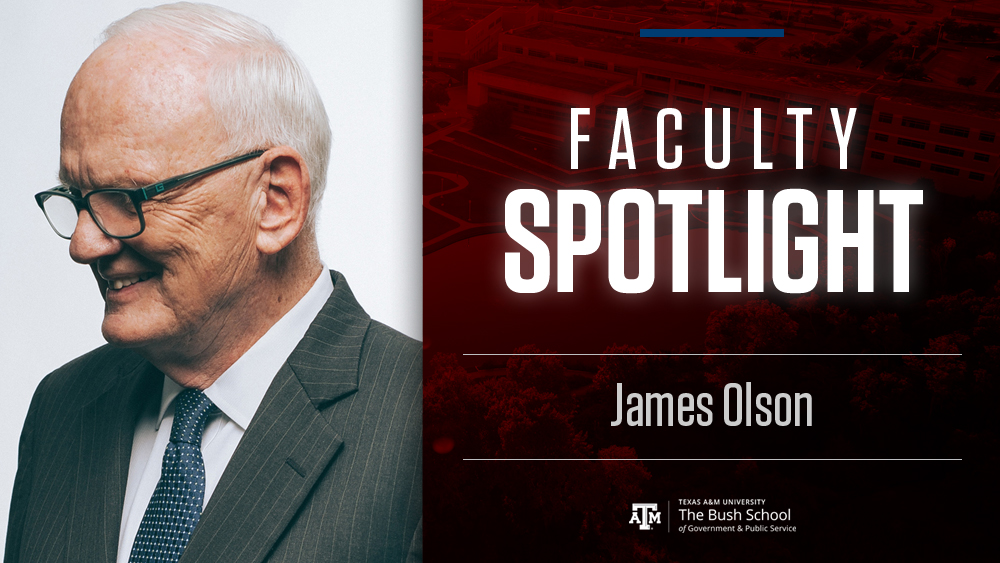
The first time Jim Olson visited the Bush School, he had to wear a hard hat. It was late in 1997 when MPIA Director Chuck Hermann gave Olson, then still employed with the Central Intelligence Agency, a tour of the Allen building facilities he would call home for the next thirteen years. After years of distinguished service with the CIA, Olson had considered teaching as a second career; and the agency’s Officer-in-Residence program would give him that opportunity. He was slated to start his time in academia in a university far from College Station when he received a call that came straight from the top. CIA Director George Tenet asked if he would consider starting his second career in Texas. Tenet had received a request for an officer to come to Texas A&M. The call had come from a man who once held Tenet’s job, George Bush, 41st President of the United States.
Olson felt it was an honor to answer the request of President Bush and carefully contemplated the decision. The fact that he had been asked by not only a former president of the United States, but also by a former CIA director, sealed the deal.
“President Bush thought it was vitally important that the role of intelligence be included in the curriculum,” said Olson; therefore he and his wife Meredith made the joint decision to move to Texas. He now says joining the Bush School faculty is the best decision he ever made. Olson remained associated with the Officer-in-Residence program for his first two and a half years at the Bush School. Once he retired from the CIA, he continued to serve his country by remaining at the Bush School to help educate the next generation of public servants.
Olson shaped the content of his courses by including exercises that would build the skills he thought most critical to a successful career. Preparing students with thorough exercises and role playing presentations are part of any Olson course.
In his course, Role of Intelligence in Security Affairs, Professor Olson has the opportunity to teach the discipline of intelligence and the vital role it plays in decision making. The course is popular with Bush School students because it directly relates to career interests in practical terms. When designing the syllabus, Olson made sure to cover the issues and concepts that would help students when they joined the workforce. “This is a very career oriented course; it is not merely academic,” he said.
Professor Olson, who had been under cover his entire career, recognized that poise was important whether it was in the field or when delivering a presentation. He describes his approach in preparing students for presentations as “tough love.” Many former students have since expressed their gratitude for the skills they gained in his International Crisis Management course. The class allows students to assume the role of a presenter whose job is to deliver information to superiors in an agency, the press, or even Congress in the midst of an international crisis. Public speaking can always cause trepidation, and some students privately confide that they are just not cut out for the class’s public speaking requirements and will have to drop it. Olson provides extra help for those students and tells them that if they continue to work hard they will improve with every presentation and promises that they will come to enjoy the opportunity to speak in public. The hard work has paid off for many students, with several contributing to the Presidential Daily Briefing and one in particular, who had considered dropping the course, winning an award for her presentation skills from the CIA.
Upon entering Professor Olson’s office, one will find a placard on his desk with a maxim he makes sure every Bush School student hears during orientation and is reminded of during the course of a visit: eschew cynicism. “It is the best advice I can give to any public servant. You will see dishonesty, corruption, and careerism. It’s easy to become cynical, but you must fight to keep your idealism. If you lose it, you will lose the meaning of being a public servant. Then you will have a job just like anyone else.”
